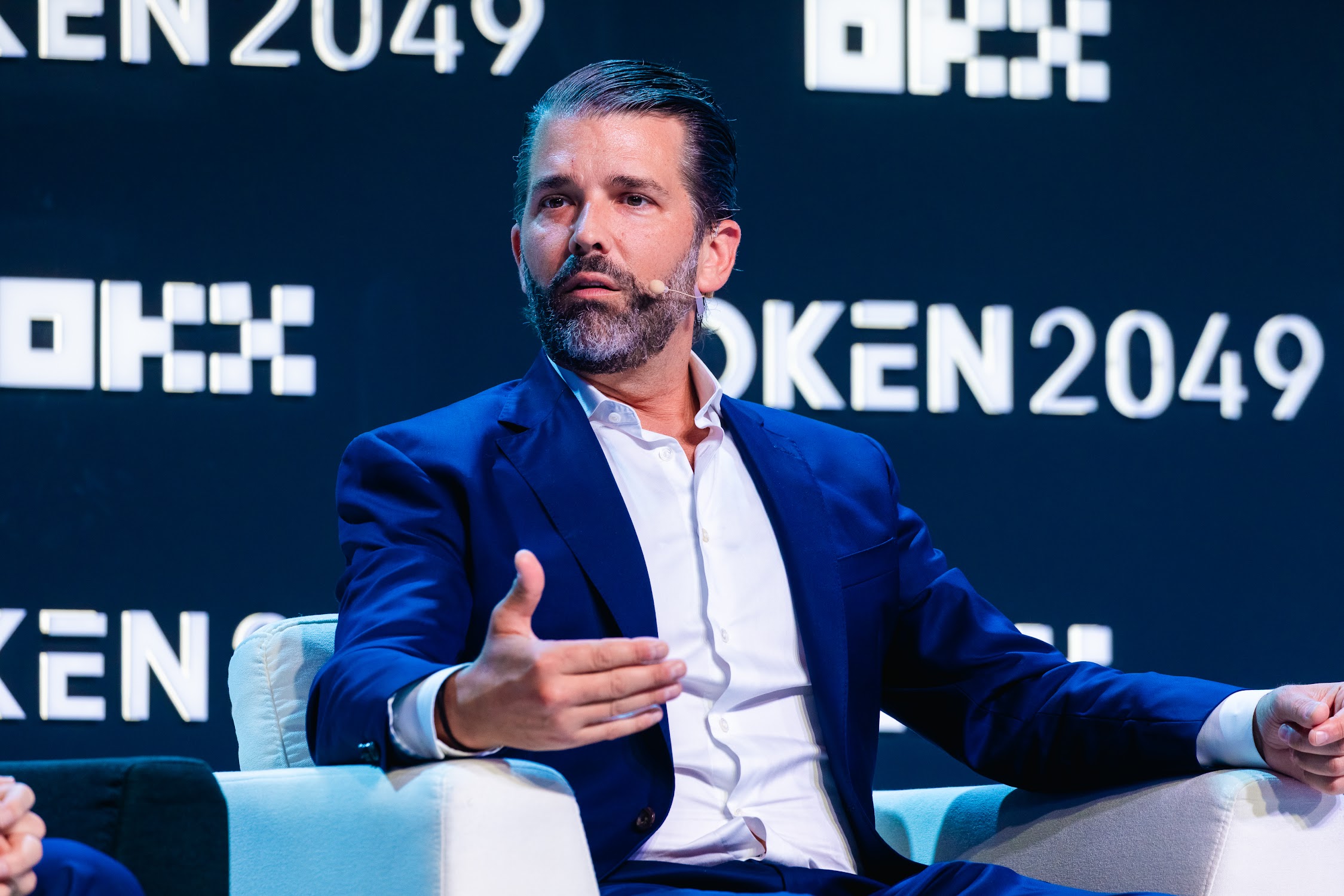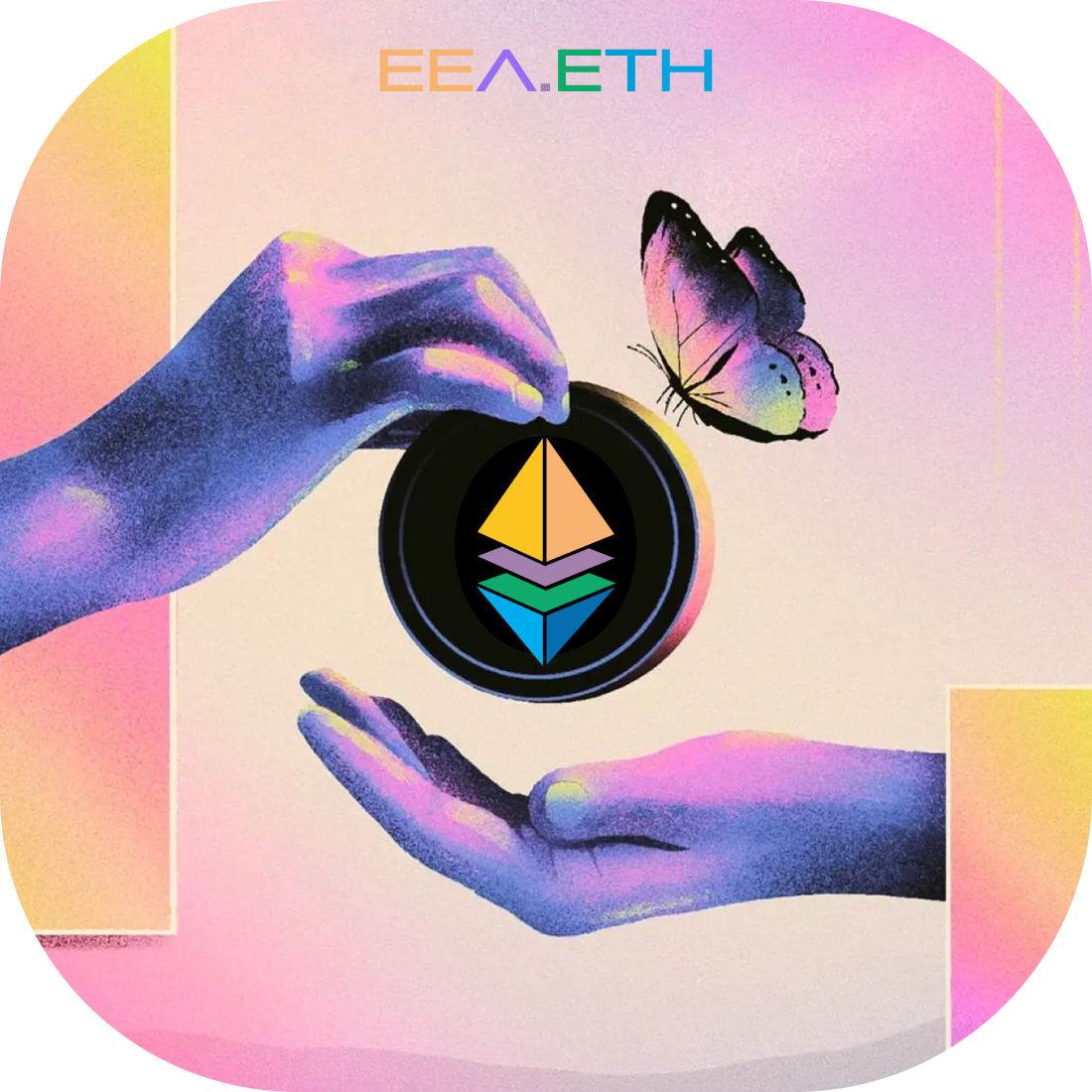State of Blockchain - More Boring or More Crazy
Bob, Kieren, Jaime and Michael were all in Singapore last week for the TOKEN2049 mega-conference.
Bob and Kieren joined Victor to reflect on the event, and on the market trends which manifested there.
Transcript
We suggest that you start at the Victor's introduction.
Contents
Small talk. Waiting for attendees
[0:03] Victor: Okay, I think we are live.
[0:06] Kieren: Live? Us?
[0:12] Victor: Let's just give a minute for people to join.
[0:16] Kieren: All righty.
[0:23] Bob: So I looked at the background noise reduction, it says not supported in this browser. I'm using Firefox, perhaps it has to be Chrome?
[0:33] Kieren: Yes. You must pick from the two available choices.
[0:40] Victor: Safari.
[0:41] Kieren: Maybe three.
[0:42] Victor: Yeah, Safari has a huge amount, just because of the iPhone.
[0:48] Kieren: Is Edge, is it called Edge still?
[0:52] Bob: Yes. Yes, nobody uses Edge, nobody.
[0:55] Kieren: Nobody uses it. I bet you it's a lot, hold on.
[0:58] Bob: I seem to remember seeing, and I can't remember if it was on Edge or Bing or probably both, but the most searched thing was how to install Chrome.
[1:10] Kieren: That's funny. Try though, they might, wow, Chrome just continues to rise in market share. It's gone from 66% roughly about a year ago to 72% now worldwide.
Safari is trending down, yeah, they're just pretty tiny. Wow, Opera is still around. That's amazing.
[1:40] Bob: They all use Chromium though.
[1:42] Kieren: Okay, fair enough.
[1:45] Victor: Oddly, my son uses Opera. Okay, we are live now on Twitter. Live, live.
Okay, so should we wait another minute or should we just start?
[2:03] Kieren: That's a good question. We can ease into the substance of the content. Do we have any minute-long non sequiturs?
Victor's introduction
[2:11] Victor: Cold opens. Well, maybe we should do our intros because we- Okay, we could do the intros. So hi, everyone.
Welcome to our week show. If you don't know, we are all part of the STRATO Mercata project that is a layer one EVM compatible blockchain focused on bringing Defi to the masses.
Now, the three of us here are all longtime builders and all Ethereum OGs.
I'm Victor Wong.
[2:48] Kieren: Vic, I don't know if you can describe yourself as an OG. I think someone else has to describe it.
[2:53] Victor: Someone has to bestow that. Okay, you two are OGs.
[2:58] Bob: Can we say it to each other?
[3:00] Victor: Yeah, can we say it to each other?
[3:01] Kieren: You are an OG, but yeah, let's do that in a circle.
[3:07] Victor: Right, exactly.
[3:09] Kieren: You can tell Bob, Bob's an OG. Bob can tell me, I can tell you.
[3:12] Victor: Yes, so we've been building since the launch of Ethereum and continue to follow this journey. So you'll get hopefully no shilling and a lot of good historical context about what we're going to talk about today. And today we are going to talk about the highlights from TOKEN2049.
And was it more boring or more crazy in terms of the blockchain world? Joining me is Bob Summerwill. Bob, you want to do a quick intro?
[3:46] Bob: Hi there, I'm Bob Summerwill. We are all, we're not old. We're all very experienced.
[3:52] Victor: Thank you.
[3:54] Bob: But yes, I'm Head of Ecosystem.
[3:58] Victor: Yeah, and Kieren, of course.
[4:01] Kieren: Yeah, I am also experienced. You know, not as long as you can be in the space, but it's starting to feel like it, right? Like we've really been around for some time. But yes, I'm …
[4:12] Victor: I'm- I will bestow the OG title on you, Kieren. So we could go around. I mean, anyone that's been around since before the launch of Ethereum and was part of it, I think, you know, that would be, we can claim that title.
[4:30] Kieren: Ah, how the time goes.
[4:33] Victor: So I will say that I was not in Singapore. I kind of played hooky with Kieren's approval. You know, international travel is brutal.
Big themes
But Bob and Kieren were there. And why, to get your kind of impressions, what do you think the big themes this year were at TOKEN2049?
[4:57] Kieren: Yeah, a bunch of big topics. One thing that was notable is that it felt like meme coins had almost completely vanished. And there was a lot of that the previous year.
[5:13] Victor: And- Can I pour one out for the meme coins, basically?
[5:17] Kieren: In meme coins defense, I'm actually kind of pro meme coin. The problem is just the time horizon that people want to make money in like seconds. Like I think if a meme around a concept, if it can kind of grow organically for some period of time is like great.
But yeah, it's just the impatience and nihilism seems to increase with each cycle. But maybe not this one. So conference felt kind of less scammy in general.
And a lot of digital asset treasury talk. I think we can go into that as we go. A lot of stablecoin talk.
You know, a lot of, you know, merger with TradFi sort of feel. I also think something has changed. I can't tell if it's just that we're all being bombarded with the same content or something's qualitatively different about the world.
Where like a year ago, it felt like the crypto was sort of peripheral to the problems with the world. And now it feels like it's like a big part of the solution. It's very strange.
And everyone sort of acknowledges that, you know, like Donald Trump Jr. was there. Like that's a big changeover. You just feel, you know, like some weeks ago, like Putin made his comments about like how the United States was trying to use stablecoins to export American inflation, which is probably true.
But it's like that's a big turnaround. It's like a from the top policy as opposed to just. And you felt that at the conference as well.
[7:03] Bob: Well, I mean, that wasn't new on the Bitcoin conference side. So I was in Nashville 2014 and Vegas, sorry, 2024. And then this July in Vegas.
So in Nashville last year, you had Trump, RFK jr. And then this year you had both Trump boys, Don Jr. and Eric were both there. And oh, my goodness, I'm forgetting his name from the UK. That will come to me in a second.
(Bob was thinking of Nigel Farage)
But yeah, and also, you know, like tons of other Congress people and state level stuff. Like that's been a real theme well in advance on the Bitcoin side. I mean, I guess essentially because you've just already got that monetary store of value use case.
It's like getting into these boring ETF, you know, treasury company, government level adoption sort of stuff that's happened earlier than on the Bitcoin side than more generally. But yeah, also, I mean, obviously, like the Trumps have got their World Liberty nonsense going on and got to be pumping that one.
More boring or more crazy?
[8:28] Victor: Well, actually, that's a good transition. So, you know, we couldn't internally we were trying to decide whether the conference was more boring or more crazy than usual. You kind of have talked about the boring elements, I guess, you know, more institutional.
And I'm curious, like, you know, since this is in Singapore, a very global conference, like what countries outside the U.S. seem to be moving in this direction? You know, like, obviously, the U.S. has been a holdup for a really long time. But, you know, how are things getting boring and how are things getting more global?
[9:05] Kieren: Bob, I want to remind you not to criticize our friends in Washington, at least in a public forum. Supporters of the…
[9:12] Bob: Yeah, I'm not getting back in.
[9:21] Kieren: So, yeah, so it's an interesting feel that the conference, I would say, it obviously represented people who are close by pretty well. But also, you know, a good number of people in from, let's say, UAE, some Europe, plenty of Americans who did the really long trip. Lots, lots of Americans, I would say.
And, yeah, I think it's a strange… The institutional feeling was much stronger than the prior year. And it's not that much time to have passed.
Like, there were many, you know, the stablecoin… Stablecoins have this institutional feel to them. Even, you know, at the beginning, they didn't.
And it is funny to watch, like, you know, I see these announcements like, you know, Tether's coming to the U.S. And they've, you know, set up a nice regulatory framework that, you know, they can work with. And I went to a side event and met some of the Tether people. It's also just funny to see them, you know, in the media, like buying sports teams and, you know, all of that.
Like, at a certain point, you get big enough, you become institutional, right?
[10:26] Victor: Right.
[10:28] Kieren: But, yeah, I think, you know, even last year, it felt like blockchain technology, at the, maybe at the lower levels of the stack, disproportionately gets created in the broader West, right? And maybe that with the exception of some of the exchanges and such. And it gets used outside the West more.
So you see stablecoin balances. Yes, they're big in the U.S., but it's kind of really a global story. Tether in particular being, like, much larger than Circle.
Obviously, I think both of them, you know, Tether purports not to serve the U.S. I'm sure there's plenty of U.S. USDT holders. Circle may be preferencing the U.S., but probably covers global as well. It's a, yeah, so the, I think it's a funny feeling in which the people at the conference are a little more like users than builders.
And there's also just, I mean, the feel, TOKEN is a little like, someone described it to me, kind of like Comic-Con. And I thought that was actually very apt. Like, there's people in funny, like, they're like astronauts.
You could take yourself as an astronaut with Justin Sun pictures of the clock as one. And like lots of, like, shiny outfits. And I think the world's tallest man was there.
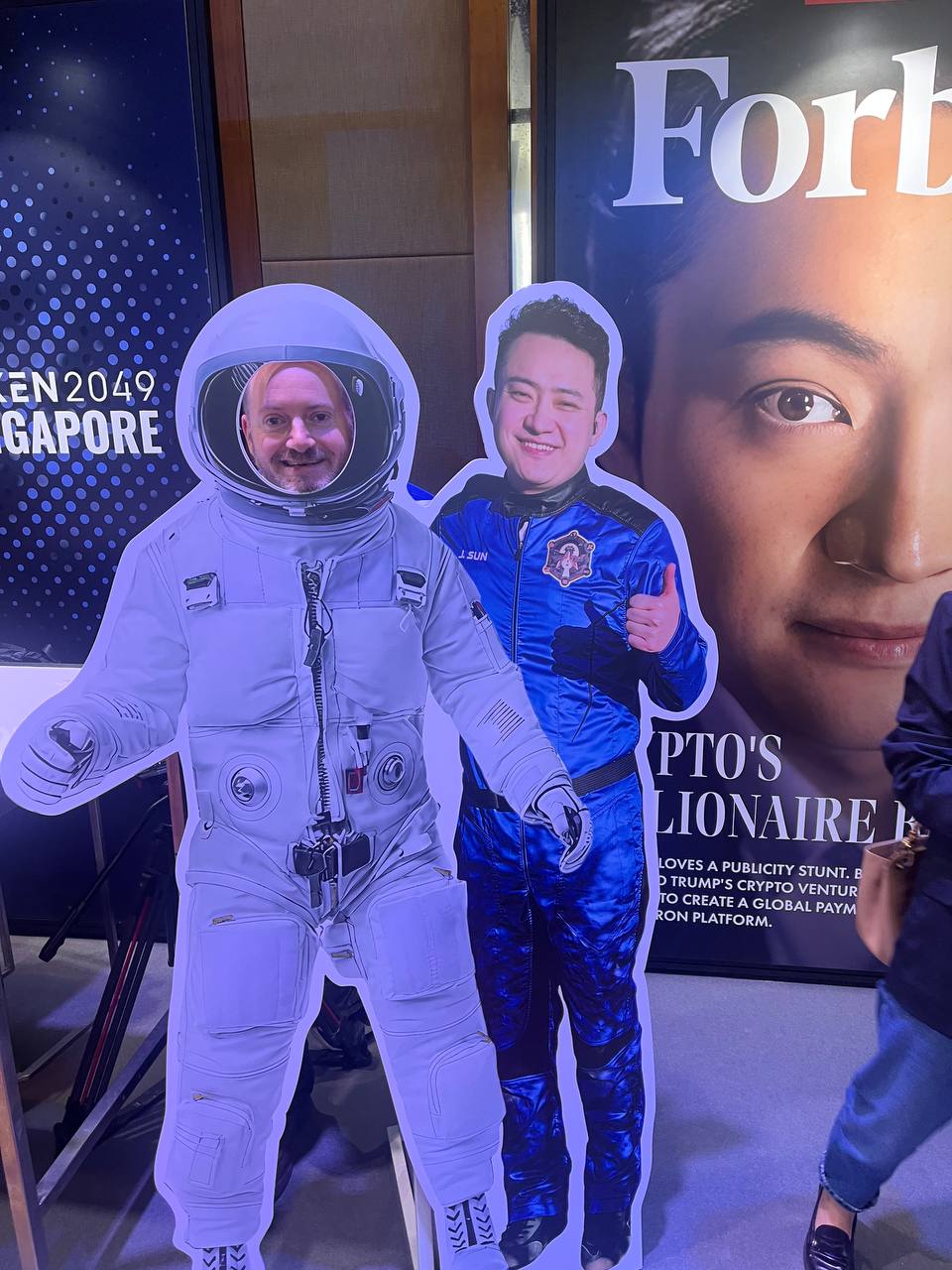
Sadly, in a wheelchair. I think he has a hard time standing. For at least for long periods of time.
(Who is apparently Sultan Kösen at 251 cm (8 ft 2.82 in))
@sultankosen82 ♬ original sound - Sultan Kösen
It was like, you saw this, like, horse in a wheelchair. I was like, no, that's a human. Like, like a really large, I don't know, eight, six or seven, 10 or something.
Like, like a really large human being.
[12:15] Victor: Well, he probably has to be in a wheelchair just so he doesn't bump his head on every doorframe that is out there. You know what I mean?
[12:23] Kieren: Yeah, yeah, exactly. And so, you know, the mix is definitely a big global conference. I think they usually get, the number you hear is like 20-ish thousand people.
Coming from hubs, you know, again, a lot of UAE, some of the European hubs. And big U.S. contingents, very long flight for us. But yeah, it was great.
You know, Singapore also is a great place to hang out. And pretty good representation of the global scene, if you will. There's also a, I don't know if this perfectly ties into the global amount. There's the feeling that the same people are manning the booths last year to this year. I've also heard very expensive conference. But the companies have in many cases changed.
Except for like the very big ones, you know, the headliners, people get invited to the stage, et cetera. A lot of turnover and who was represented at the conference. So, you know, in some ways, being a media company is one of the better ways to, you know, survive cycles in crypto.
Just someone will pay that big conference fee.
[13:33] Victor: Yeah. And it seems those fees are getting bigger and bigger too, right? It's just very, very expensive.
[13:37] Cleaner: Garbage?
[13:38] Kieren: I got a phone call.
[13:39] Cleaner: Garbage?
[13:44] Victor: So, yeah. And we don't want to keep you too long. Obviously, you got important things to do around the house.
Bob, what do you think about the global and the boring part of it?
[13:56] Bob: So, yeah, I mean, I guess just something else to say that is I've been to a lot of conferences. I've never seen somewhere with so much floor space of expo halls. Just on and on and on.
Like, honestly, like city blocks. Many, many city blocks worth of stuff. You know, and then you go, oh, right. Yeah, there's another whole floor of this. Yeah, it's twice as much as you thought.
[14:23] Victor: Even bigger than DEVCON in Thailand last year? Because I remember looking, you know, getting my step tracker and like seeing like, oh, man, 15,000 steps in the conference center.
[14:36] Bob: Bigger in terms of the expo area, certainly. You know, like DEVCON was a large, you know, floor area, but it was lots and lots of different rooms of talks. And then little stalls, whereas this is just, you know, expo hall of selling. I don't know what most of them were.
Thousands and thousands of projects that you've never heard of doing a thing that is pretty indistinguishable from everybody else. So, yeah, talking about the turnover, Kieren, I mean, I'm sure that's the case is the vast majority of them are going to be gone in a year's time.
And never even know they happened.
[15:16] Victor: But do you guys think the boringness comes from institutions themselves or what they're doing? Because everyone seems to be doing like stablecoin or treasury company, you know, like that. Those seem to be the two options.
[15:30] Kieren: Yeah, I think it's a strange thing in which like the meme coins ended to some degree with the U.S. elections. And like, I feel like $Libra was really the end, you know, in which, you know, a coin associated with a public official did pretty badly for the people involved. Excuse me.
[15:59] Victor: And sorry, I thought you were talking about the Facebook Libra.
[16:02] Kieren: No, no, no, no. Yeah, the Milei associated meme. The Milei associated meme, gotcha.
[16:08] Bob: There was a Hawk Tuah coin as well, wasn't there?
[16:11] Kieren: Yeah, I think it was before, though. I feel like that was not the end, but yes, it's sort of, you know, I think they've kind of peaked. Pump.fun still seems to be doing lots and lots of launches in revenue, but no one is really talking that much about it anymore. And we're getting back to something like you either have to have tech or now you have to have revenue. And it's gotten almost like a mirror of the public equity markets in which people are, you know, something like when I talk at more length another time, I keep seeing criticism of, say, Uniswap because they generate a lot of fees. But a lot of those fees go directly to the Lab company and they don't go to the protocol or and they have to turn the protocol fees on and would then start theoretically buying back the token.
Whereas folks like Hyperliquid, there's no Lab skim and there are pretty big buybacks going on and the token price has gone up. And, you know, people argue Uniswap has a kind of conflict of interest there. But anyway, the point being, like, suddenly it all became about like revenue, US dollar denominated yields, like how to do not quite a SPAC.
Most of these treasury companies are an existing publicly traded company. And there's, you know, maybe not a formal takeover with a change of control, but usually like an injection of capital that the company is doing something else right now. And then it starts digital asset treasury operations.
You know, like there was a panel, Tom Lee gave a lot of like numbers on how big his digital asset treasury company is, what chunk of ETH it holds, you know, now what the trend is, all that sort of thing. And they've, I guess, Michael Saylor kind of pioneered, I don't know if he was there, I don't think he was, some of the financial engineering that kind of creatively let him acquire as much Bitcoin as possible. And all these folks are then kind of in the, I would argue like part of the TradFi mindset, people make complicated products that sort of favor the house in a sense.
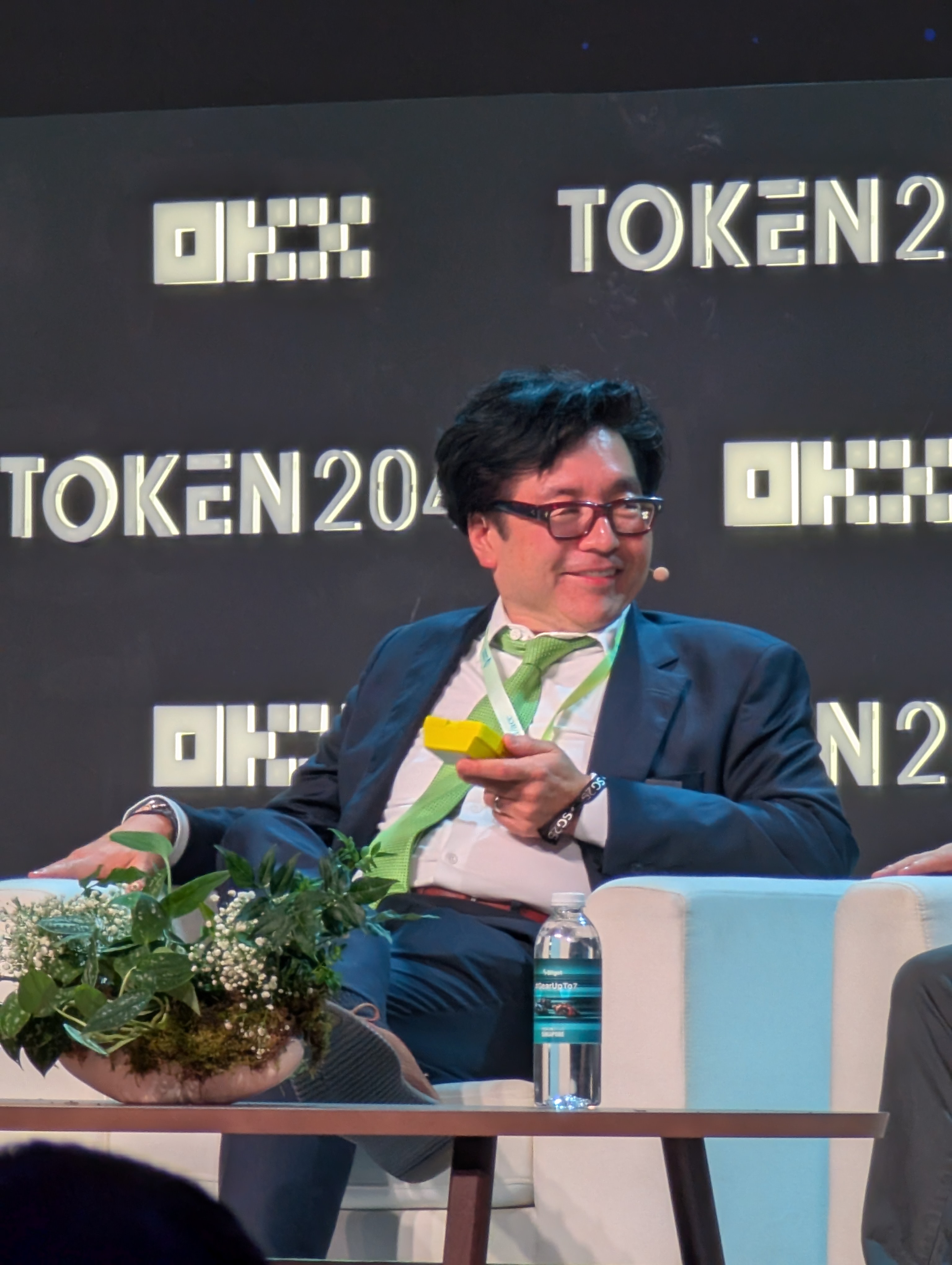
So that, you know, no matter what, like the client has an idea, but the institution does okay, right? And some analog of that is going on, you know, people are purchasing, like a lot of the time you would just want to hold tokens directly as opposed to invest in a digital assets treasury. I guess I think the digital asset treasuries may be better than the ETFs.
The ETFs promise to do nothing and charge a fee where the digital asset treasuries don't really charge a fee and maybe do something creative. So, you know, it's like, it's the entrance of a new venue of financial engineering. But I also think they're kind of brilliant in the following sense.
It's a tremendous pain to be a public traded, say, U.S. company. It's expensive, there's a lot of compliance burden and so on. Tokens are out there, they get liquidity in some ways.
You might want liquidity from the U.S. public equity markets for your token. You could do this by IPO-ing a company, like Coinbase is sort of a vehicle for that. But then you've got to like report on the extremely complicated, no doubt, operations of Coinbase and it's whatever, a thousand employees and, you know, all that.
Or you could just have a thing by the token. I mean, you like never have to IPO the Labs company and you can kind of just get all of the capital without the much heavier reporting burden of being a publicly traded actual company. And this is like kind of genius.
It's a great way to bring in more kind of bigger, more boring, more conservative capital while not changing the premise that much. So yeah, it's gotten, the suits are good at that. You know, and the digital asset treasuries provide a good wrapper for the thing that probably most of us would hold as Spot.
[20:43] Victor: By the way, we have a comment from Shiba who says he loves your take on meme ecosystems. You know, not surprisingly, someone who has their own meme ecosystem.
[20:55] Kieren: You got to hodl the memes, that's the key.
[20:57] Kieren: Shout out to you, Shiba. Bob, so what do you think about, you know, treasuries and stablecoins?
Enterprise blockchain maturity
[21:04] Bob: Yeah, I mean, you know, I guess this is all sort of maturity. And it's a strange kind of feeling, you know, looking back on all of our joint experience, sort of on Enterprise Ethereum efforts kicking off in 2016, 2017.
And really the thought there that all of these public and private use cases could all be met by suitably modular codebases and thinking EVMs. And, you know, and here we are, you know, that you've got, you know, you've got Stripe announcing Tempo and having a, you know, a consortium of companies doing that kind of payments.
You know, set up and then you've got, you know, NASDAQ announcing, you know, equities on chain again with a Besu derivative.
And then you've got Base and Coinbase. And, you know, all of these things are happening in a very similar kind of form to what we were shooting for all that time back.
And that's, you know, while these things are kind of a bit boring, it is also quite amazing that we've got to that place that these very conservative incumbents have caught up without thinking, you know. It's pretty amazing.
[22:43] Victor: Well, I think part of it and maybe one of the reasons as builders we find it boring is that effectively there are no tech innovations really that are driving this. Right. It's really it's really about people who already have a bunch of money pouring more money into the seams of it.
Institutional approval
[23:02] Kieren: At a time, you know, I think most much of the space was extremely eager for institutional approval, even with some, you know, nominal hostility to it. And I now feel the emotion that like I'm like, I almost don't want it. I'm like, get out of here.
Like, I want I want it to go back. You know, I guess I'm happy maybe about the, you know, asset values, although it's not my primary motivation at all. But I hope that they don't because the thing you see with like, you know, the let's let's the Web2 world, while the Internet remains at least kind of open, the people use like six apps.
And so it's just pretty easy to affect the whole planet of users of the Internet just through these six apps. And I kind of it could easily happen that way in crypto, where crypto itself remains totally open. But like, as a for instance, so it's a company, we have a Coinbase account, which we use a little bit.
And they are way more difficult and onerous and making information requests all the time than any bank I've dealt with. It's bizarre. Like, they try to introduce a like, whitelist for like the accounts you could send out to this is like a month ago, or like, apparently, you could turn this feature off.
And it's for your protection, you know, in case, in case someone's gotten in there. But it's like, you're worse than the thing you said that you were like, setting out to destroy from a is it our money perspective. And that feels, you know, I'm happy that the GENIUS Act passed, I think, but it also has that feel too Coinbase itself is now in like a fight with the banks like, wait, we didn't mean we didn't mean you could do this, that we wanted all yield vans.
So it's given me.
[25:22] Bob: Yeah, well, I mean, I guess they do get leaned on more than the banks, though, right? Because they're they're kind of in this new energy area. So, you know, all of this stuff is just very rigid and defined and the borders never move on the bank side.
But then, you know, on a on a crypto exchange side, it's kind of a bit of both. And so they're always going to be moving around a bit. And they're always going to get whacked down.
[25:47] Kieren: I think fintechs in general, they're like, maybe a little leaner, probably a little faster on things than the banks. And it almost feels like they're overzealous in terms of their compliance posture, because they feel that they can get kicked around in the way like the banks are just a little less worried. The banks are, you know, tons of them have been leaned on too, right, in very much the same way.
But it seems like a slower and less aggressive process somehow.
[26:19] Bob: Yeah, well, I mean, because they're generally not trying to do new things, right? You know, the fintechs are moving around. So it might be like, we're all compliant and good today, but then we might be doing a new thing next week.
And no, they don't like that. So we better be on good behavior, get the brownie points, whereas the banks are very rarely doing anything new and different. So they don't really worry so much, I don't think.
[26:45] Victor: Yeah, I mean, I kind of feel like what we've really seen is just like, regulation was like the lid on a bucket. And the minute you move that lid, the demand, like the real level of demand that we're seeing now is what sort of always existed. But it's just been held back for a really long time.
[27:03] Kieren: Yeah, the Circle IPO was kind of crazy. It was it showed, you know, just like how much it went up after listing, like how much pent-up demand is out there if this is even like slightly allowed.
[27:17] Victor: Yeah, and I feel like the treasury companies are a similar thing, right? Like all of those things. Well, while we're getting to that point, how do you think things are getting a little bit more crazier than last year?
[27:30] Kieren: Yeah, things are happening fast. The turnover is still huge in the space. I would say there are still lots of good new projects that feel like they come out of nowhere and are pretty successful.
Like I'm friends socially with the CEO of Lighter. And like he told me about it like a year and a half ago or two. Like I read the paper, I was like, okay, I kind of get it. Like circuits for matching and so on. It's like, it's huge now. Like over in the DEX wars are just sort of heating up.
The perp DEX is, there's like a new perp DEX a minute. Yeah, I think, I guess the pace at which things can happen seems to just be accelerating. And the cycles, so I was talking to a friend who's kind of investor, kind of runs an incubator sort of thing.
And he said that he's done better not thinking about it as a four-year cycle anymore. Because it's sort of, it feels like they're compressing and they're kind of mini cycles within the cycle. And yeah, I suppose just everything is heating up in that way.
Booth babes
I'll, a friend of ours sort of made a joke. So in the US, probably in Canada, we do not have a booth babe culture. Maybe, I'd heard that like, you know.
[29:07] Victor: That used to be.
[29:08] Kieren: Yes, we had one once.
[29:09] Victor: As someone who's gone to like gaming conferences.
[29:11] Kieren: Practically illegal. Yes, exactly. I think booth babes are gone.
But TOKEN was very much like a booth babe conference. And in fact, they were sort of like, almost like seemingly more of them than last year. And then this led to like, does this mean we're near the top?
Like, you know, like is the price speculation at a maximum at this moment? And I got, you know, it wasn't euphoria. But people were feeling pretty good.
And I like a conference when people are feeling a little shitty.
[29:47] Victor: Right.
[29:47] Kieren: Because then, you know, there's room for things to run. I think, yeah, like for better or for worse, interest in the industry as a whole just trends upwards with prices. So like, it's good for us for prices to go up.
But yeah, I mean, I could see, I think the digital asset treasuries too are also evidence that it's kind of late cycle. But even still, stuff is just happening really quickly. Like, I think products kind of mostly work in crypto now.
There's a strange moment where like DeFi just worked. And this is part of the reason we really got into it. It definitely like only kind of worked through 2021, 2022, maybe even 2023.
And then it just kind of functions and it's big. Like every week or so, I see like one of the Aave people tweet, like how big it would be compared to the U.S. banks. And it's like 47, 43, 36, you know, it's running.
And so there's a feeling of inevitability that kicked in for me like a couple months ago that, you know, has I've never quite felt.
[31:11] Victor: What about you, Bob? What did you find, you know, on the craziness level? What do you think?
Top signals
[31:19] Bob: I can't have been in the right bit of the building. I didn't see any booth babes. Where were they?
I saw lots of people in like the costumes, like, you know, the mascots or what have you. But something else I was just thinking, which is good, talking about top signals is there wasn't an excessive Ripple representation. So, because that's always a good top sign, right?
Is if there's lots of interest in XRP, that signals new entries into the market.
[32:02] Kieren: I wonder if that's changed. It used to be like, the joke that I've both experienced in my face-to-face life and like on crypto-twitter, it's like when you're like, dentist or realtor friend asks you about what you think about Cardano or Ripple, then it's time to sell, you know.
[32:25] Bob: There was plenty of Charles, but no Ripple-ers.
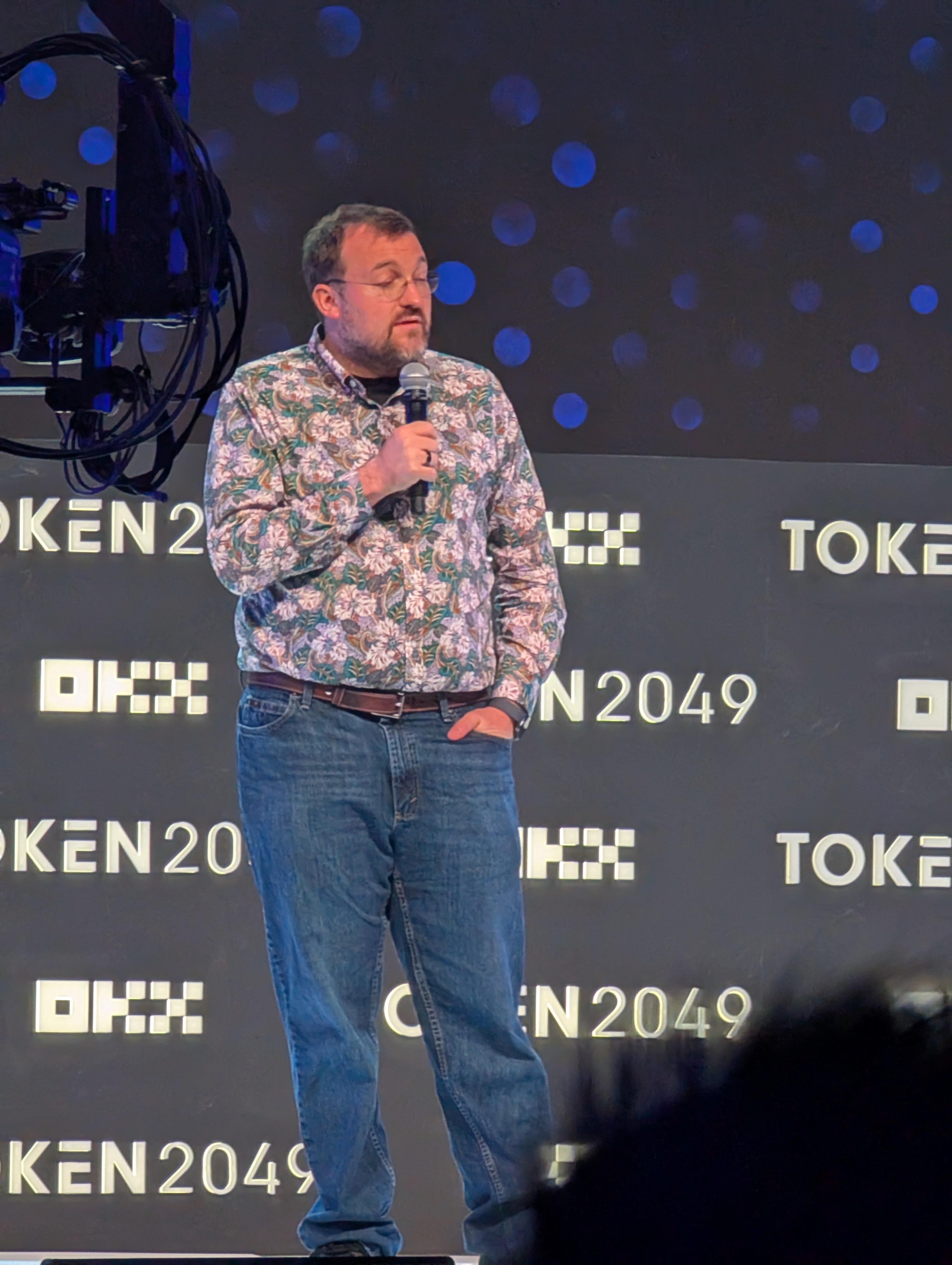
[32:32] Kieren: Yeah, I wonder. I think BNB flipped XRP recently.
[32:39] Bob: They did, I just saw that. Yeah, up to number three.
[32:45] Victor: Amazing. How are you guys feeling about like, you know, like having been in the space for so long that long-term projects like MetaMask are now launching a token?
[32:54] Kieren: Oh, yeah, yeah. This is another part of the crazy. This is a good reminder.
I think it basically just a lot was held back by uncertainty. And so like the high quality stuff, a strange thing about the Gensler era was that it felt like at least the eye of Sauron was on the good projects, and the bad projects, in a sense, were sort of left to run. And the good ones, so like any industry, like if you looked at all of the businesses, most of them are bad.
Most of them go out of business. And if you imagine if you like made all the businesses publicly traded, most of the stocks would go to zero. So you would kind of expect in crypto that like most tokens are bad.
You know, it's sort of like what you would see if you just made essentially no barriers to entry to like publicly listing stock. Not that tokens are stock, but anyway. So however, if you kind of market cap weighted, you would probably find that the things near the top are pretty high quality.
And then sometimes things will come out of the bottom and go into the top. But they're like by and large, you should sort of forget about that long tail of things. And it did feel like to a significant degree, the eye was on the big things and it tried to destroy them before there was a token or freeze them or what have you.
And it left the bad stuff to run amok, contributing to the impression that the space was just like all scams. And like it might be all scams by number of projects, like the average project might be a scam or just not worth any value. But like the average business is like not a good business.
But the big ones are good most of the time, not all the time. And they're kind of just being allowed out. You know, Circle IPO, good example, MetaMask token, you know, it's like probably they should have had one a long time ago.
Like they've been using it for a long time. They probably wanted a token.
[35:08] Victor: Well, I remember the height of this for me was when the SEC filed charges against Binance and Coinbase in the same week. It's like, we're just going to look at something with the word exchange in it and then go after that, right? It's like the most compliant exchange and the least compliant exchange.
[35:27] Bob: No, it is. I mean, the other thing that you have there was, yeah, it was like the good actors that were getting the legal action.
[35:36] Victor: Yes, exactly.
[35:37] Bob: Basically, because the good actors were, you know, staying on shore and trying to work through the thing and get to a resolution.
Whereas all the baddies are just like, "yeah, we're out of here. We're not serving US people. Right, we'll scam away. We're not even going to make any effort to be compliant of anything and you can't get us", you know.
So it was almost by definition that the good actors were the ones that got whacked because they stayed around to get whacked and kept coming back for more and more whacking until, you know, the whacking ceased eventually.
But yeah, I mean, I think another crazy thing is I think we're going to have masses of ICOs like tons and tons of them coming up.
[36:24] Victor: Well, on that, I think we've crossed the 30-minute mark. I wanted to ask you guys, do you have any closing thoughts about TOKEN2049 or where we're at in the overall state of blockchain?
[36:38] Kieren: One thing I would say, I was reminded, food is excellent in Singapore. If you, for those who haven't, but there was a hawker market in the conference. It was kind of crazy.
Return of retail
[36:48] Kieren: They like made one, you know, it was very cool. That's awesome. I'm pretty optimistic.
These are good times. A lot of work ahead, obviously, I think. But yeah, it feels like it was a good marker of some sort of tipping point.
Again, for a couple of months, I've been feeling the inevitability kind of based, even though parts of me doesn't like it, on the institutional buy-in. It's gotten to the point where I think they don't just roll it back like they did last time. Like, you know, customers are demanding it.
And, you know, like, I think like people who said they'd never custody crypto, just like stood it up quickly. And, you know, it's probably too intermingled now to really remove the, you know, the next, you know, if sentiment changes towards crypto in the US and elsewhere. And then there's like a lot of thinking to do about what, you know, completing the product, so to speak.
Like it's a strange thing in which retail was in for a while and maybe got burned kind of culminating with FTX. It probably hasn't come back all that much and the institutions are in now, which means that retail will eventually come back. And we cannot burn retail again, you know, like it just has to be better than, I think one of the things we think about is just the absolute experiences that totality has to be better than whatever service it's displacing, banking, you know, FX exchanges, whatever.
It's not all financial services, obviously, but a lot of them are. And this includes things like making sure people don't lose the keys somehow or what have you. So there's like a needle that's right there, but I think that's gonna be a lot of what the next phase is about.
[38:59] Victor: Bob, what do you think?
[39:01] Bob: Well, I mean, I think the way that that will happen for a lot of retail is that they're not gonna have their hands on directly. It'll all be through these instruments. So their experience is just, oh yeah, I've got a brokerage account and there's those in it as well, but they kind of, they look indistinguishable to, you know, to commodities or equities or bonds or anything else.
It's just, yeah, there's some more financial instruments and then you go. So I think that's your sort of speculative retail, you know, crypto as an investment people. What I think is gonna be more interesting to watch is sort of the payments side, you know, especially with the Stripe project there, you know, if you get to a place where lots of just regular payment flows can be using crypto rather than fiat, that's really interesting, you know, that you can start getting real velocity of non-speculative use.
Because everything really at this point has pretty much been speculation or, you know, a little bit of payments, but not really any large volume of payments, you know, early on it's like, you know, buy your coffee with Bitcoin and that didn't last very long and that kind of hasn't really come back. But really with the stablecoins and these large, you know, integrations, you know, like PayPal as well, you know, PayPal are doing things, MasterCard have announced stuff. I'm sure, you know, all of these payment rails are gonna be joining in on the game and that really changes things.
Devconnect
[40:45] Victor: Yeah, and one question, like, are we going to DevConnect? I know me and Bob have already bought our tickets. Kieren, you're the holdout.
Can I get a commitment?
[40:54] Kieren: I'm still a probable. One, I've never been to Argentina. I really do wanna go.
But…
[41:04] Victor: I really wanna see what's going on. Yeah, I haven't been to South America and I really wanna see what's happening in the crypto world over there because you hear a lot about it. Obviously, there are big exchanges and big projects there.
So I'm just really curious to find out.
[41:17] Kieren: Vitalik said he's more likely to get recognized in Buenos Aires than in the U.S.
Socials
[41:22] Victor: Yeah, well, and so if you like this content, please join us every week.
We have this at the same time. And follow us on Twitter, at @stratomercada with an A and join our Telegram community.
Bob, if they wanna hear more from you, where can they find you?
[41:40] Bob: Yeah, so I'm just @bobsummerwill, same as my name on Twitter.
[41:46] Victor: And Kieren, where can people find you?
[41:50] Kieren: @kjameslubin, so shortened, but my name also on Twitter / X.
[41:58] Victor: And you can find me at @vic4wong on Twitter. Bob and Kieren have both shamed me publicly because I have so few followers, even though I was an early adopter. So please, please connect to me.
Love to hear from you.
[42:11] Bob: What's the "4" about? What's the "vic4"?
[42:16] Victor: So four is a number that no Chinese person likes because it sounds suspiciously like death. So it's, you know, back in the world of eight character usernames, I could always get "vic4wong" having an Asian name with the number four in it, like pretty much guaranteed that I could get it.
[42:42] Kieren: Always doing things the Wong way.
[42:44] Victor: Exactly. I've never heard that joke before. Okay.
Thank you, everyone. See you again next week. Take care.
Cheers, guys.
